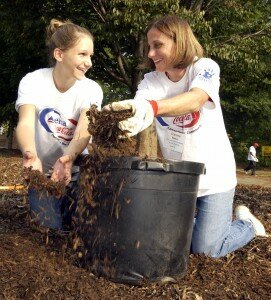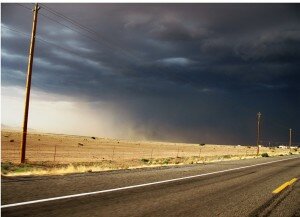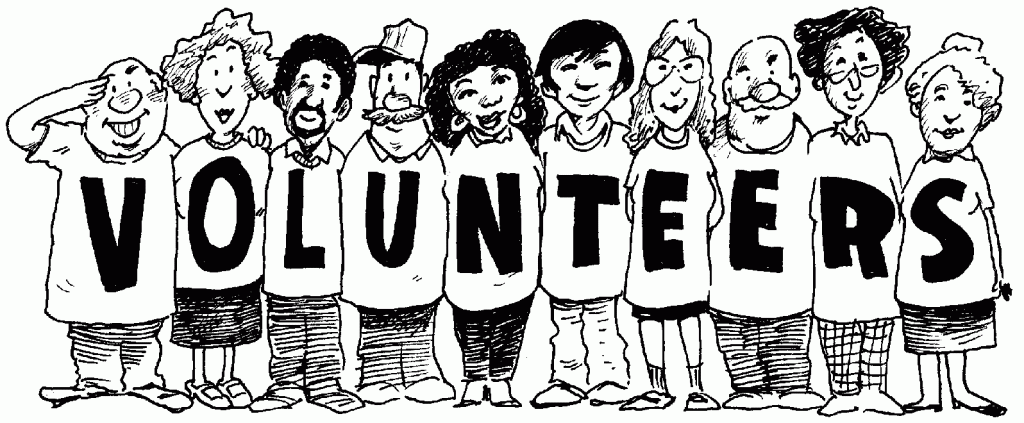 Why do you volunteer? That’s the question we all want the answer to, as it varies so much from person to person. We collect stories, read studies, and browse charts & infographics in pursuit of the common theme. We love volunteers and never tire of hearing the inspiration behind the time and effort they give to the causes and organizations they are passionate about.
Why do you volunteer? That’s the question we all want the answer to, as it varies so much from person to person. We collect stories, read studies, and browse charts & infographics in pursuit of the common theme. We love volunteers and never tire of hearing the inspiration behind the time and effort they give to the causes and organizations they are passionate about.
So why do you give your time?
I give time to your cause because it makes me feel generous.
…because I was asked.
…because I want to show support for a friend who is involved.
…because you asked me to, and it’s hard to say no to you.
…because I want to be recognized.
…because I want to keep busy.
…because I feel guilty.
…because I don’t want to seem apathetic.
…because it’s my duty.
…because you make me feel needed.
…because I have a personal connection or stake in the challenge you focus on and the solution your organization is working for.
…because its good for my health & perspective.
…because you inspire me.
…because I identify with your story.
…because my spouse volunteers with you or sits on your board of directors.
…because I want the t-shirt (mug, calendar, raffle prize).
…because I was in a giving mood.
…because it’s my job.
…because it’s an escape from my job.
…because it looks good on my resume.
…because it’s fun.
…because I want to pay the benefit I got from your organization forward.
…because your organization’s professional staff are so nice to me.
…because you’re changing the world somehow and I want you to keep on making changes.
…because volunteering makes me feel cool.
…because volunteering makes me feel happy.
…because volunteering makes me feel hopeful.
…because volunteering makes me feel part of a community.
Why do you volunteer? Let us know in the comments below!




 Plan for changing weather. Keep an eye on the weather reports a few days before your project and up to your project day. Weather in the summer can turn from bright and sunny to clouds and rain very quickly. Make sure you’re prepared for possible changes in the weather.
Plan for changing weather. Keep an eye on the weather reports a few days before your project and up to your project day. Weather in the summer can turn from bright and sunny to clouds and rain very quickly. Make sure you’re prepared for possible changes in the weather.
 Water. When you’re working in the sun it’s important to make sure you’re drinking enough water. Make sure there’s plenty of water for the volunteers that you’ll have on site, and make sure that they take a minute or two for themselves to drink water throughout the day. Even if they don’t think they’re thirsty, encourage volunteers to drink something. Staying hydrated helps volunteers to stay sharp and safe.
Water. When you’re working in the sun it’s important to make sure you’re drinking enough water. Make sure there’s plenty of water for the volunteers that you’ll have on site, and make sure that they take a minute or two for themselves to drink water throughout the day. Even if they don’t think they’re thirsty, encourage volunteers to drink something. Staying hydrated helps volunteers to stay sharp and safe.

 Who is in charge of managing volunteers? Is there a process in place for handling new volunteers? Ensuring that volunteers are appropriately assigned and supported is a collective responsibility, and everyone understands how their piece relates to the whole.
Who is in charge of managing volunteers? Is there a process in place for handling new volunteers? Ensuring that volunteers are appropriately assigned and supported is a collective responsibility, and everyone understands how their piece relates to the whole.

 Today’s post comes from Rafael González, Chief Service Officer for the City of Los Angeles.
Today’s post comes from Rafael González, Chief Service Officer for the City of Los Angeles. You’ve thanked the volunteers that serve with your organization, right? Thanking them when they’re serving is important, but it’s also important to show them that their service is important even when they’re not serving. A thank you note sent to a volunteer at their home is a great reminder that they’re an important part of the organization. Here are eight tips for writing personal thank you notes to your volunteers:
You’ve thanked the volunteers that serve with your organization, right? Thanking them when they’re serving is important, but it’s also important to show them that their service is important even when they’re not serving. A thank you note sent to a volunteer at their home is a great reminder that they’re an important part of the organization. Here are eight tips for writing personal thank you notes to your volunteers:

 2.) Be OK with Lone Rangers. Baby boomers have never been “joiners” and that doesn’t show any signs of ch-ch-changing. While they are less likely to want to be part of an organization, informal volunteering has jumped with this generation. In 2009, 57 percent
2.) Be OK with Lone Rangers. Baby boomers have never been “joiners” and that doesn’t show any signs of ch-ch-changing. While they are less likely to want to be part of an organization, informal volunteering has jumped with this generation. In 2009, 57 percent 

